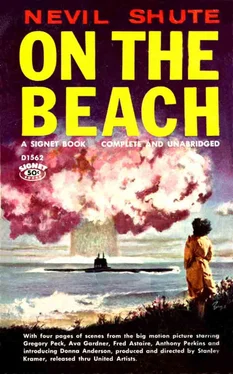Nevil Shute Norway - On the Beach
Здесь есть возможность читать онлайн «Nevil Shute Norway - On the Beach» — ознакомительный отрывок электронной книги совершенно бесплатно, а после прочтения отрывка купить полную версию. В некоторых случаях можно слушать аудио, скачать через торрент в формате fb2 и присутствует краткое содержание. Жанр: unrecognised, на английском языке. Описание произведения, (предисловие) а так же отзывы посетителей доступны на портале библиотеки ЛибКат.
- Название:On the Beach
- Автор:
- Жанр:
- Год:неизвестен
- ISBN:нет данных
- Рейтинг книги:4 / 5. Голосов: 1
-
Избранное:Добавить в избранное
- Отзывы:
-
Ваша оценка:
- 80
- 1
- 2
- 3
- 4
- 5
On the Beach: краткое содержание, описание и аннотация
Предлагаем к чтению аннотацию, описание, краткое содержание или предисловие (зависит от того, что написал сам автор книги «On the Beach»). Если вы не нашли необходимую информацию о книге — напишите в комментариях, мы постараемся отыскать её.
On the Beach — читать онлайн ознакомительный отрывок
Ниже представлен текст книги, разбитый по страницам. Система сохранения места последней прочитанной страницы, позволяет с удобством читать онлайн бесплатно книгу «On the Beach», без необходимости каждый раз заново искать на чём Вы остановились. Поставьте закладку, и сможете в любой момент перейти на страницу, на которой закончили чтение.
Интервал:
Закладка:
“Could anybody be alive up there?”
“I wouldn’t think so. It’s not quite impossible. He’d have to be living in an hermetically sealed room with all air filtered as it comes in and all food and water stored in with him some way. I wouldn’t think it practical.”
She nodded. “Is it true that Cairns is out, Dwight?”
“I think it is—Cairns and Darwin. Maybe we’ll have to go and see those, too. Maybe that’s why Peter has been drafted into Scorpion. He knows those waters.”
“Somebody was telling Daddy that they’ve got radiation sickness in Townsville now. Do you think that’s right?”
“I don’t really know—I hadn’t heard it. But I’d say it might be right. It’s south of Cairns.”
“It’s going to go on spreading down here, southwards, till it gets to us?”
“That’s what they say.”
“There never was a bomb dropped in the Southern Hemisphere,” she said angrily. “Why must it come to us? Can’t anything be done to stop it?”
He shook his head. “Not a thing. It’s the winds. It’s mighty difficult to dodge what’s carried on the wind. You just can’t do it. You’ve got to take what’s coming to you, and make the best of it.”
“I don’t understand it,” she said stubbornly. “People were saying once that no wind blows across the equator, so we’d be all right. And now it seems we aren’t all right at all. . . .”
“We’d never have been all right,” he said quietly. “Even if they’d been correct about the heavy particles—the radioactive dust—which they weren’t, we’d still have got the lightest particles carried by diffusion. We’ve got them now. The background level of the radiation here, today, is eight or nine times what it was before the war.”
“That doesn’t seem to hurt us,” she retorted. “But this dust they talk about. That’s blown about on the wind, isn’t it?”
“That’s so,” he replied. “But no wind does blow right into the Southern Hemisphere from the Northern Hemisphere. If it did we’d all be dead right now.”
“I wish we were,” she said bitterly. “It’s like waiting to be hung.”
“Maybe it is. Or maybe it’s a period of grace.”
There was a little silence after he said that. “Why is it taking so long, Dwight?” she asked at last. “Why can’t the wind blow straight and get it over?”
“It’s not so difficult to understand, really,” he said. “In each hemisphere the winds go around in great whorls, thousands of miles across, between the pole and the equator. There’s a circulatory system of winds in the Northern Hemisphere and another in the Southern Hemisphere. But what divides them isn’t the equator that you see on a globe. It’s a thing called the Pressure Equator, and that shifts north and south with the season. In January the whole of Borneo and Indonesia is in the northern system, but in July the division has shifted away up north, so that all of India and Siam, and everything that’s to the south of that, is in the southern system. So in January the northern winds carry the radioactive dust from the fall-out down into Malaya, say. Then in July that’s in the southern system, and our own winds pick it up and carry it down here. That’s the reason why it’s coming to us slowly.”
“And they can’t do anything about it?”
“Not a thing. It’s just too big a matter for mankind to tackle. We’ve just got to take it.”
“I won’t take it,” she said vehemently. “It’s not fair. No one in the Southern Hemisphere ever dropped a bomb, a hydrogen bomb or a cobalt bomb or any other sort of bomb. We had nothing to do with it. Why should we have to die because other countries nine or ten thousand miles away from us wanted to have a war? It’s so bloody unfair.”
“It’s that, all right,” he said. “But that’s the way it is.”
There was a pause, and then she said angrily, “It’s not that I’m afraid of dying, Dwight. We’ve all got to do that sometime. It’s all the things I’m going to have to miss. . . .” She turned to him in the starlight. “I’m never going to get outside Australia. All my life I’ve wanted to see the Rue de Rivoli. I suppose it’s the romantic name. It’s silly, because I suppose it’s just a street like any other street. But that’s what I’ve wanted, and I’m never going to see it. Because there isn’t any Paris now, or London, or New York.”
He smiled at her gently. “The Rue de Rivoli may still be there, with things in the shopwindows and everything. I wouldn’t know if Paris got a bomb or not. Maybe it’s all there still, just as it was, with the sun shining down the street the way you’d want to see it. That’s the way I like to think about that sort of place. It’s just that folks don’t live there any more.”
She got restlessly to her feet. “That’s not the way I wanted to see it. A city of dead people. . . . Get me another drink, Dwight.”
Still seated, he smiled up at her. “Not on your life. It’s time you went to bed.”
“Then I’ll get it for myself.” She marched angrily into the house. He heard the tinkle of glass and she came out almost immediately, a tumbler more than half full in hand with a lump of ice floating in it. “I was going home in March,” she exclaimed. “To London. It’s been arranged for years. I was to have six months in England and on the Continent, and then I was coming back through America. I’d have seen Madison Avenue. It’s so bloody unfair.”
She took a long gulp at her glass, and held it away from her in disgust. “Christ, what’s this muck I’m drinking?”
He got up and took the glass from her and smelled it. “That’s whisky,” he told her.
She took it back from him and smelled it herself. “So it is,” she said vaguely. “It’ll probably kill me, on top of brandy.” She lifted the glass of neat liquor and tossed it down, and threw the ice cube out upon the grass.
She faced him, unsteady in the starlight. “I’ll never have a family like Mary,” she muttered. “It’s so unfair. Even if you took me to bed tonight I’d never have a family, because there wouldn’t be time.” She laughed hysterically. “It’s really damn funny. Mary was afraid that you’d start bursting into tears when you saw the baby and the nappies hanging on the line. Like the squadron leader in the R.A.F. they had before.” Her words began to slur. “Keep him occ . . . occupied.” She swayed, and caught a post of the verandah. “That’s what she said. Never a dull moment. Don’t let him see the baby or perhaps . . . perhaps he’ll start crying.” The tears began to trickle down her cheeks. “She never thought it might be me who’d do the crying, and not you.”
She collapsed by the verandah, head down in a torrent of tears. The submarine commander hesitated for a moment, went to touch her on the shoulder and then drew back, uncertain what to do. Finally he turned away and went into the house. He found Mary in the kitchen tidying up the mess left by the party.
“Mrs. Holmes,” he said a little diffidently. “Maybe you could step outside and take a look at Miss Davidson. She just drank a full glass of neat whisky on top of brandy. I think she might want somebody to put her to bed.”
Конец ознакомительного фрагмента.
Текст предоставлен ООО «ЛитРес».
Прочитайте эту книгу целиком, купив полную легальную версию на ЛитРес.
Безопасно оплатить книгу можно банковской картой Visa, MasterCard, Maestro, со счета мобильного телефона, с платежного терминала, в салоне МТС или Связной, через PayPal, WebMoney, Яндекс.Деньги, QIWI Кошелек, бонусными картами или другим удобным Вам способом.
Интервал:
Закладка:
Похожие книги на «On the Beach»
Представляем Вашему вниманию похожие книги на «On the Beach» списком для выбора. Мы отобрали схожую по названию и смыслу литературу в надежде предоставить читателям больше вариантов отыскать новые, интересные, ещё непрочитанные произведения.
Обсуждение, отзывы о книге «On the Beach» и просто собственные мнения читателей. Оставьте ваши комментарии, напишите, что Вы думаете о произведении, его смысле или главных героях. Укажите что конкретно понравилось, а что нет, и почему Вы так считаете.












